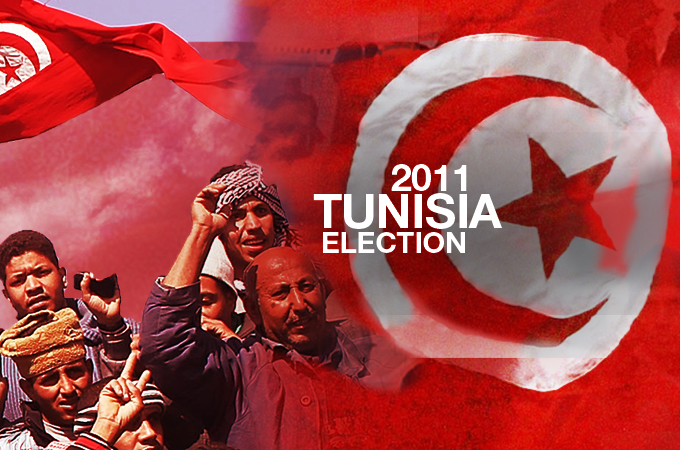Icon of Tunisian uprising runs for office
Tunisian revolutionary and lawyer Abdennaceur Laouini talks to Al Jazeera about why he is campaigning as an independent.

 |
| “I’m optimistic, because these are revolutionary times,” Laouini says [Yasmine Ryan/Al Jazeera] |
BIR ALI BEN KHALIFA, Tunisia – Few of the candidates running for the election can match Abdennaceur Laouini’s revolutionary credentials.
Video footage of the young lawyer crying out with ecstasy in front of the interior ministry on the night of January 14 after news broke that former President Zine El Abidine Ben Ali had quit the country has come to embody a moment that millions of Tunisians shared with him.
Laouini was at the forefront of the lawyers’ protests that began in December 2010.
Even before the uprising, he had years of activism against the former regime and multiple prison sentences under his belt. As a student, Laouini was one of the principle leaders of the student protests in Gafsa in 1998.
Parties ranging from al-Nahda to the Free Patriotic Union (UPL) asked the staunchly leftwing activist to run on their lists, but true to form, Laouini rejected their advances and chose to run as an independent candidate.
Al Jazeera’s Yasmine Ryan joined him on his campaign for the independent list in the governorate of Sfax.
Yasmine Ryan: You are running for election in the governorate of Sfax, which is very wealthy region. Are you optimistic about your chances of winning?
Abdennaceur Laouini: Yes I’m optimistic, because these are revolutionary times. The revolution is continuing, step-by-step, that’s why we’ve adopted the symbol of a bicycle. The Tunisian people have transformed from being a subjugated population to an activist people, aware of what is happening nationally, locally and internationally.
I was one of the symbols of this revolution, and this is helping me on the campaign. I’m trying to reach out to the population directly, with the help of a small group of activists.
So I’m optimistic about the revolutionary, democratic change in Tunisia.
|
On January 14, Abdennaceur Laouini intentionally broke the former government’s curfew in an act of defiance |
YR: As an independent candidate, how do you feel about how the electoral campaign is going? Do you feel that the rules are fair to those that don’t have a political party backing them?
AL: The candidates running on independent lists are disadvantaged. Firstly, the election process is centred on lists, not individuals, a detail which favours political parties. The material and legal rules of the election were written to suit political parties, not independent candidates.
YR: Is the financing offered by the state enough for independent candidates?
AL: No the financing is insufficient. For instance, here in Sfax there are 240,000 voters, divided into eight electoral districts, including half of the town of Sfax. For someone running on an independent list, it will be very difficult. The authorities give an advance of 3,000 Tunisian Dinars [$2,115], but this doesn’t even cover the costs of printing campaign material. We spent more than 5,000 TND on the flyers, brochures and posters alone.
The confrontation will be between two camps: the camp of conviction and the camp of money.
For us, it’s based on our willpower and our ability to connect with the population. We depend on volunteers who can’t campaign fulltime and have to find their own means to travel.
YR: You have been critical of certain parties for handing out money to win votes. What are the implications of this for Tunisia’s democratic transition?
AL: They’re trying to undermine the election. They’re trying to manipulate it. This is influencing Tunisian voters to freely chopse who they will vote for, because [these politicians] are profiting from the poverty and marginalisation of Tunisian citizens to buy their vote.
Our campaign hinges on this, we are against the speculators who want to transform the election into a stock market that they can gamble on.
But the electoral system has been constructed in a way that means no single party can have a majority in the constituent assembly.
YR: You’ve often criticised the interim prime minister, Beji Caid-Essebsi. What do you think of his recent visit to Washington DC?
AL: The prime minister and the rest of the interim government haven’t been elected and are there temporarily, so they don’t have the authority to represent the Tunisian people internationally, whether it is the US, European countries or any other foreign power. He doesn’t have this right.
Mr. Essebsi doesn’t have a political programme, he’s a member of a temporary government that is only supposed to take care of the day-to-day running of the country.
We’re ruptured with the old regime and we are in the middle of preparing for the new regime and its political and economic direction.
What is Mr. Essebsi reason for taking on foreign debt? His government’s mandate will expire on October 23. So why is he speaking in the name of the Tunisian people?
YR: Speaking of money from abroad, do you think the interim government has done enough to recuperate the money taken from the country by the former president and those close to him?
 |
| Read more of Al Jazeera’s coverage of the Tunisia election |
AL: Not at all. Most of the members of the current government were active in business. There were three or four companies in the hands of Ben Ali’s inner circle. Did [the members of the interim government] have business ties? If you know the answer to this question, you will see that it’s clear that this government is not motivated to recuperate the money that has been pillaged and sent overseas.
YR: Many Tunisians seem cynical about political parties. Do you think it’s possible to maintain a system where there are so many independent candidates and parties, like yourself?
AL: After this election, we will move into the rhythm of an electoral cycle. Some parties will disappear. The proliferation of political parties is a reaction. Tunisians were politically repressed for over 50 years. They didn’t have the right to form political parties and to express themselves.
What we’ve been experiencing since January 14 is the rebound; it’s more psychological than rational. But we will get through this period and many political parties will fuse, form alliances or disappear.
Right now Tunisian society is in transition and mutation, but we will move on to a more mature stage.
YR: You are against all former members of the RCD [Ben Ali’s former political party] participating in the political process … [Note: Senior members of RCD who had been active in the party during the last 10 years are banned, but Laouini wants this to go further]
AL: Yes of course. We need to introduce laws banning all members of the RCD from participating in political life for at least ten years. The French and the Germans did this after World War II with the Nazis.
The former RCD members committed crimes. They monopolised political power for 50 years. They had their chance and they wasted it.
The Tunisian people have revolted against despotism and now it’s time for them to create a democracy without the RCD.
YR: During the protests before January 14, did you think that it would finish with Ben Ali abandoning power?
AL: We held a major demonstration in our lawyers’ robes, in front of the courthouse on the 28 December [in Tunis] and that was the first time we called for Ben Ali to go. From that date, the history changed and the clock was ticking. I was sure [he would go] because we had decided to wage a battle to the death against Ben Ali. That was how we lived it.
January 14 was a day of enormous joy for me, it was a dream. As someone who had spent much of my live as an activist in Tunisia, who been beaten by the police hundreds of time, who had been arrested many times … I was bursting with joy at this moment, because it was victory.
You can follow Yasmine on Twitter at @yasmineryan